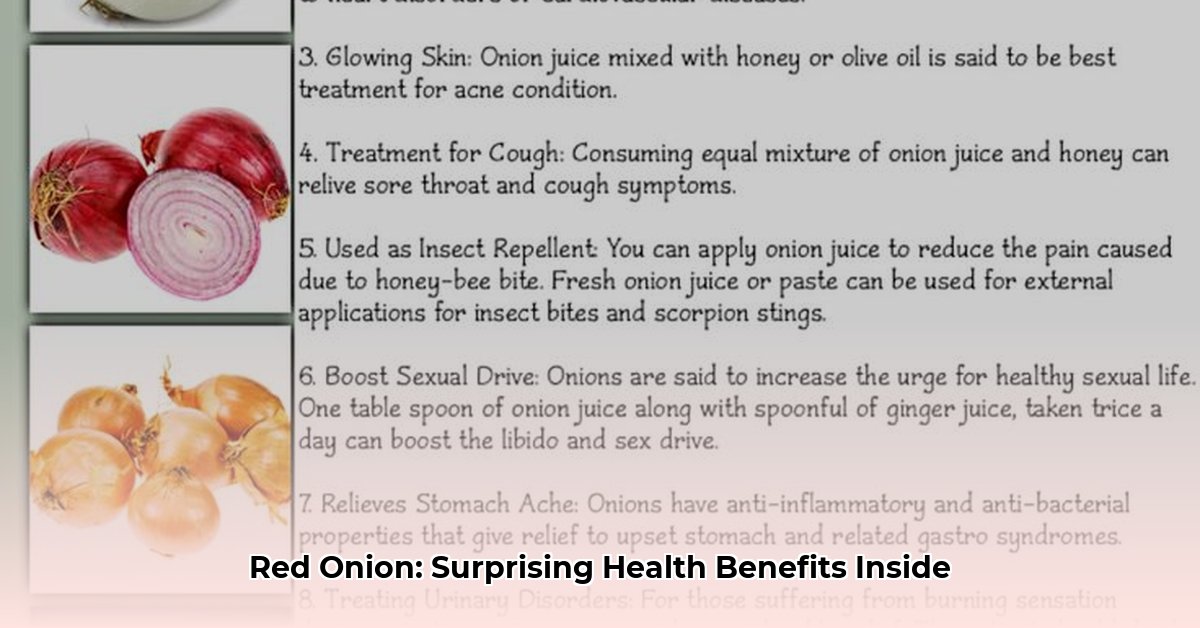Red onions offer a vibrant hue and pungent flavor, but their benefits extend far beyond the culinary realm. This guide delves into the nutritional profile of red onions, exploring their vitamins, minerals, and potential health benefits.
Decoding the Nutritional Value of Red Onions
Red onions are low in calories and fat, while offering a good source of fiber and several essential micronutrients. Here’s a breakdown of the nutritional content per 100g serving of raw red onion:
| Nutrient | Amount | % Daily Value (DV) | Potential Benefits |
|---|---|---|---|
| Calories | 42 | Provides energy. | |
| Total Fat | 0.08g | 0% | Minimal impact on daily fat intake. |
| Saturated Fat | 0.026g | 0% | Negligible saturated fat content. |
| Cholesterol | 0mg | 0% | Cholesterol-free. |
| Sodium | 3mg | 0% | Very low sodium content, beneficial for blood pressure management. |
| Total Carbohydrate | 9.7g | 4% | Primary energy source, including beneficial fiber. |
| Dietary Fiber | 1.7g | 6% | Supports digestive health and promotes satiety. |
| Sugars | 4.28g | Naturally occurring sugars. | |
| Protein | 1.4g | Contributes to tissue building and repair, though not a significant source. | |
| Vitamin C | 16mg | 18% | Supports immune function and acts as an antioxidant. |
| Vitamin B6 | 0.1mg | 6% | Supports brain health and various metabolic processes. |
| Folate (B9) | 19mcg | 5% | Essential for cell growth and development. |
| Potassium | 146mg | 3% | Helps regulate fluid balance and muscle function. |
| Calcium | 23mg | ~2% | Contributes to bone health. |
| Iron | 0.5mg | ~3% | Essential for oxygen transport. |
| Magnesium | 10mg | ~2% | Supports nerve and muscle function. |
| Phosphorus | 29mg | ~3% | Important for bone health and energy production. |
| Manganese | 0.1mg | ~5% | Supports bone health, wound healing, and metabolism. |
Practical Serving Sizes and Calorie Counts
Visualizing 100g can be tricky. Here’s a practical guide to red onion serving sizes:
- Thin Slice: ~4 calories
- Medium Slice (1/8 inch): ~6 calories
- 1 ounce, raw: ~11 calories
- Small Onion: ~29 calories
- Medium Onion: ~46 calories
- Large Onion: ~63 calories
- ½ cup chopped: ~32 calories
- 1 cup chopped: ~64 calories
Highlighting Key Nutrients and their Roles
Red onions offer more than just calories and macronutrients. They contain several vitamins and minerals crucial for various bodily functions:
- Fiber: Supports digestive health, promotes regularity, and may contribute to feelings of fullness.
- Vitamin C: A potent antioxidant that supports immune function and collagen production, vital for healthy skin.
- Vitamin B6: Plays a crucial role in cognitive function and various metabolic processes.
- Folate: Essential for cell growth and development, particularly important during pregnancy.
- Potassium: An electrolyte that helps regulate fluid balance, muscle contractions, and blood pressure.
- Quercetin: A flavonoid antioxidant being studied for its potential anti-inflammatory and cardiovascular benefits. Research suggests quercetin may help reduce inflammation and support heart health, but more studies are necessary.
- Chromium: May play a role in blood sugar regulation, a factor important for managing conditions like type 2 diabetes. Further research is needed to fully understand chromium’s impact on blood sugar control.
- Anthocyanins: These pigments give red onions their vibrant color and act as antioxidants, potentially protecting cells from damage. While the exact mechanisms are still under investigation, anthocyanins are believed to contribute to various health benefits.
Red Onions vs. Other Onion Varieties
While all onions offer health benefits, red onions often boast a higher concentration of anthocyanins and certain flavonoids compared to white or yellow onions. This difference likely contributes to their distinct color and potential health advantages, though more research is needed.
Incorporating Red Onions into Your Diet
Adding red onions to your diet is easy and delicious. Consider these options:
- Salads: Add a crunchy, tangy kick.
- Sandwiches and Burgers: Layer them for extra flavor and texture.
- Salsas and Guacamole: Provide a zesty punch.
- Roasted Vegetables: Their sweetness intensifies when roasted.
- Grilled Meats: A flavorful topping for grilled dishes.
- Pickled Onions: Add a tangy twist to tacos, sandwiches, or salads.
Important Considerations
While this guide provides comprehensive information, it should not be considered medical advice. Nutritional content can vary based on growing conditions, storage, and preparation methods. Consult with a healthcare professional or registered dietitian for personalized dietary guidance. Ongoing research continues to explore the full extent of red onions’ potential health benefits. It’s important to interpret current findings with caution and await further studies for confirmation.
- How To Make Free Electricity To Run Your Home With Renewable Sources - February 12, 2026
- How to Produce Free Energy for Your Home - February 11, 2026
- How to Generate Electricity for Free at Home - February 10, 2026
















